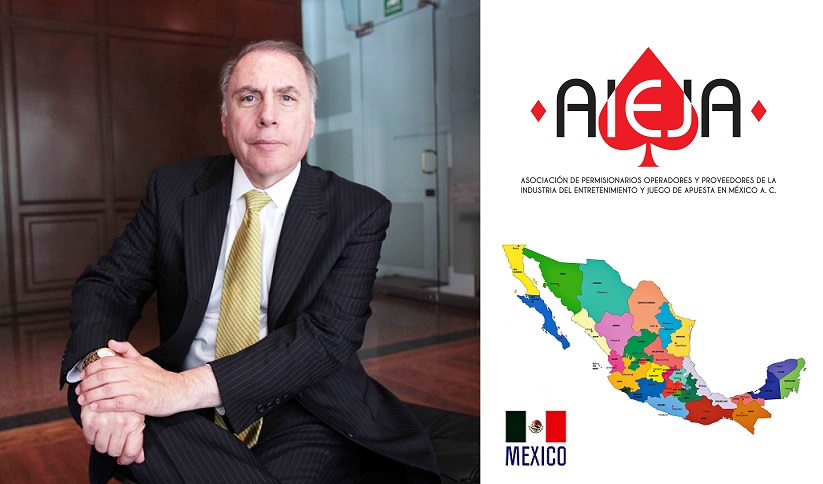
You have been leading AIEJA for over 11 years since its creation in November 2009. What balance can you make on the achievements of the organization and its role as a key representative of the gaming sector in Mexico?
The reality of Mexico and its gaming market have changed a lot over these eleven years. In fact, eleven years ago, the world of casinos was just beginning in our country. All this happened despite the fact that current legislation that rules our sector is very old: it dates from 1947. It was not until 2006-2007, when the first important permits began to be granted, that the industry really advanced. From that moment until today, the growth of Mexican gaming has quadrupled and has allowed not only permit holders and operators to participate in this market, but also manufacturers and suppliers of the industry. 50,000 direct jobs and 120,000 indirect have been created. At the legislative level, in 2004, Law Regulation was issued, which two important reforms: one in 2012 and the other in 2013. In addition, in January 2016, there was a historic ruling from Mexican Supreme Court of Justice, which favored the industry. AIEJA has gained an important role in this time, becoming the voice of the sector in Mexico, both nationally and internationally. We have had relationships with all federal, state and municipal governments, as well as with all the national trade union associations and many from other countries. Although the pandemic has been an obstacle, thanks to virtual communication, it has not prevented us from being in contact with everyone. On the other hand, my work was based on the search for unions strengthening, respecting the diversity of the actors that belong to our industry.
Gambling in Mexico presents several underlying problems: a) an old Federal Law (1947) that has not yet been updated; b) National governments that do not seem to have a clear policy about the sector (fourteen regulators in the last three presidential terms); and c) a part of society that still looks at gaming with distrust. What is your consideration on these issues and how the sector should define a more direct communication to get closer to its stakeholders?
It’s hard to understand, but gambling in Mexico seems to be a forbidden subject. In 1998, a first attempt was made to draft a new Law that was practically hampered by the Church and right-wing political parties. However, there still was some push for this Law and, although there was no reform in these 73 years, industry found some momentum through its Regulations in 2004 and the ruling of the Supreme Court of Justice of 2016, as I already indicated. State governments are still fearful in relation to the sector; but they have seen in it a source of potential income, by creating new taxes, some of them very disproportionate. In this context, substantial tax contributions from our companies finally helped casinos to have a better consideration from local authorities, both in the States and in the municipalities. In any case, gambling is still viewed with a lot of distrust, although those who play at casinos, in a land-base or virtual modality, can deny these prejudices. People who have contact with the industry could also confirm that, in Mexico, gambling is really a healthy and joyful entertainment for the entire population of legal age and, in particular, for people over 40 years old. So from AIEJA, we continue communicating with whoever is necessary and, fortunately, this occurs in a positive environment.
Instead of talking about the impact of COVID-19 in land-based gaming, I’d like to focus on the gradual reopening of halls, the call for clients, the need for fiscal measures that ensure future sustainability of operations and economic reactivation. Added to this is your assertion that the virus “helped gaming executives to bond” in order to defend their rights and achieve their goals. What is your view on these topics and how do you ponder a possible commercial recovery of operators over the next two years?
It is clear that COVID-19 not only surprised Mexico, but the world. Our industry was hit especially hard. We were the first to close the activities and the last to resume them. It seems that we are the ‘Industry of Evil.’ However, we are a sector that creates employment, attracts investment and generates resources through taxes. It is true that we need unified fiscal measures that give certainty and security to investors. It is also essential to initiate a process of reactivation, albeit gradually, of the gaming halls. Today, two out of every three halls in Mexico are open. However, their capacity is reduced to 30%, which does not allow a total recuperation of gaming economy. Even so, present time is just a seed that will germinate in 2021, with the reactivation of the economy waiting for a 100% recovery in 2022. Of course, we have to consider the unfortunate casualties that this pandemic will produce at the end of 2020.
Another irregularity of the Mexican market is that, in the face of strong growth in online gambling, there is no technical regulation that contemplates this modality and allows the State to receive taxes. In your own words: “Of the total offer of online gambling in Mexico, only 40 percent is authorized by the Ministry of the Interior.” How to solve this dilemma and stop illegality?
In Mexico, we have had constant changes of gaming regulators. When in Peru, for example, we see a regulator with 14 years in a row in charge of gambling, or in Colombia, with almost 8 years working very well, in Mexico, on the other hand, in 14 years there were 14 regulators. This has caused great instability, a lack of state policy on gambling. Obviously, the specific issue of online gambling has not been directly addressed by the Government. Taking into account the bills that have already been prepared and our close collaboration, Government could eliminate, at once, the other 60% of the online gambling offer that is not officially registered by the Ministry of the Interior. Without going into further details about these mechanisms, I think that gaming control should go through cybernetic police supervision, in addition to promoting legal measures that would contain this avalanche of online gambling sites. We are talking about more than 2,000 pages and digital portals not recognized by the Mexican authorities that offer this type of service.
One of the main demands of the sector is the creation of a decentralized and autonomous entity to rule the activity, rather than a state Secretariat. Why do you prefer this structure? Do you think this proposal can be discussed, accepted and applied in the medium to long term?
Today, Mexican regulator, head of the General Directorate for Gaming and Raffles of the Ministry of Internal Affairs, has the discretionary power in matters of gambling, either for the granting of permits, as well as regarding the cancellation of these licenses or on the closing of the gaming halls. This authority has been, as I have already mentioned, highly ‘fluctuating’, which has produced enormous instability and great insecurity among those regulated. Indeed, this could be resolved with the creation of a Plural Authority, with five representatives of the Secretariats directly or indirectly related to gambling. These could be the Ministry of the Interior, the Ministry of Finance, the Ministry of Tourism, the Ministry of Economy and the Ministry of Public Security. So yes, I believe that this issue could be settled, but in the medium term.
What challenges will AIEJA have to face to keep on supporting members of the sector, promoting responsible gaming, mediating with the State and improving gaming reputation before Mexican society?
The challenge is important. In its first decade, AIEJA was born, grew and now has to consolidate. It seems to us that, indeed, we must continue working around these four issues: 1) support for members of the sector; 2) progress in responsible gambling that has been ignored by the Mexican government; 3) the mediation with the authorities, not only national, but also state and municipal, and 4) the continuity of our good relationship with national and international media, to change the image of gaming and spread what this industry really is: a healthy leisure activity that includes the entire population, but particularly the adult 40+ citizens, who values gaming as an entertainment option they cannot find in other segments of society.

